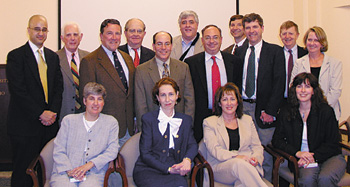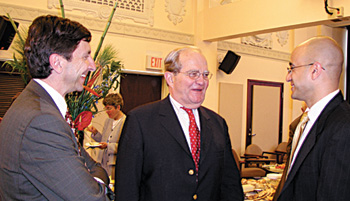This year marks a milestone for the Fee Arbitration Board as it celebrates its 30th anniversary in resolving fee disputes between lawyers and clients.
"Reducing the contentiousness of deciding what a reasonable attorney fee should be is the primary service the Fee Arbitration Board offers to the bar and to the client," said Fee Arbitration Board chair Paul Nicolai.
Nicolai credits the service for bringing fairness to both the public and the bar.
"We should put ourselves in a position that we are accountable to our clients without causing them to go through undue, unnecessary contortions to obtain justice," Nicolai said. "Justice ought to be a standard feature of dealing with a lawyer."
 |
| Gathering to celebrate the 30th anniversary of the MBA' Fee Arbitration Board are (from left, standing) Peter Mina, MBA manager of Professional Programs; Jack Goldstein, volunteer arbitrator; Paul Daley, FAB member; Blasdel Reardon, volunteer arbitrator; Steven Stein, FAB member; Paul Nicolai, FAB chair; Brian Bixby, FAB member; MBA President Richard C. Van Nostrand; Frank Teague, FAB member; Ed Pendergast, volunteer arbitrator; and Susan Sylva, volunteer arbitrator; and (seated, from left) Karen Levitt, FAB member; Iris Taymore Schnitzer, FAB member; Rosemary Purtell, FAB member; and Alison Mills Cloutier, FAB member. |
 |
| Enjoying the 30th anniversary of FAB are (from left) MBA President Richard C. Van Nostrand, FAB volunteer arbitrator Blasdel Reardon and Peter Mina, MBA manager of Professional Programs. |
This year marks a milestone for the Fee Arbitration Board as it celebrates its 30th anniversary in resolving fee disputes between lawyers and clients.
"Reducing the contentiousness of deciding what a reasonable attorney fee should be is the primary service the Fee Arbitration Board offers to the bar and to the client," said Fee Arbitration Board chair Paul Nicolai.
Nicolai credits the service for bringing fairness to both the public and the bar.
"We should put ourselves in a position that we are accountable to our clients without causing them to go through undue, unnecessary contortions to obtain justice," Nicolai said. "Justice ought to be a standard feature of dealing with a lawyer."
Hundreds of cases have come before Fee Arbitration Board panels in the past 30 years. Just since Jan. 1, 2003, panels have heard 112 cases representing $5.2 million in fees. The MBA's Fee Arbitration Board may be the oldest of its kind.
Members of the Fee Arbitration Board, volunteer arbitrators and MBA President Richard C. Van Nostrand gathered together May 17 to celebrate the board's anniversary.
"You do such a wonderful job," Van Nostrand said. "It is such an important function, not only for the bar but for the public … You are a real credit to this association and this anniversary is a real credit to you for giving up your time to serve on this board."
There are 17 members of the Fee Arbitration Board, which oversees the administration of the legal fee arbitration program, recommends policies to the public and the MBA House of Delegates and publishes the influential and useful Fees & Client Funds book. More than 70 volunteers serve as arbitrators.
If the amount of fees in dispute is less than $10,000, a single attorney will preside over the arbitration. The attorney practices in the area of law in which the fee dispute arose. For example, if the fee dispute stems from a divorce case, another divorce attorney will serve as the arbitrator.
If the fee dispute is more than $10,000, a panel of three arbitrators will hear the case. Of the three arbitrators, one is a non-lawyer and the other two are lawyers. The chief arbitrator on the case also practices in the area of law in which the fee dispute arose.
Arbitrators volunteer their time. Though this doesn't occur very often, hearings have gone as long as two and a half days.
Arbitrators hear disputes between attorneys and clients as well as between attorneys and other attorneys.
The process begins when a party petitions to have the case heard before a Fee Arbitration Board panel and the other party agrees. Following that, parties may submit any supporting documentation such as a written fee agreement, bills, etc. This is followed by a hearing and a decision. Hearings generally are held in MBA offices in Boston and Springfield. If parties disagree with the arbitrator or panel's decision, the party has 30 days to appeal their dispute to superior court.
"It's a great service for parties to resolve disputes fairly, quickly and inexpensively," said Steven Stein, a 15-year FAB member. "It's a great public relations service of the MBA."
Without FAB and organizations like it, attorneys and clients would have to resort to filing litigation in courts, which could be more costly and take much longer to resolve. It generally takes six months or less for an arbitrator or a panel to issue a decision from the time in which a petition is filed, Stein said.